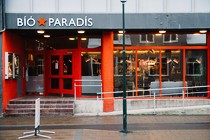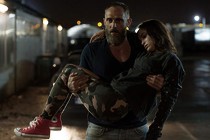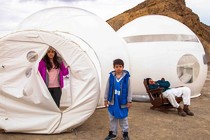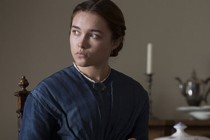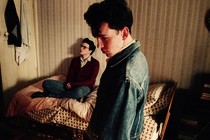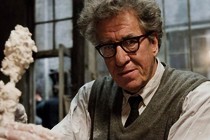BERLINALE 2017 Out of competition
Final Portrait: Eighteen days of sitting for Giacometti
- BERLIN 2017: Stanley Tucci's fifth film as a director looks into the personality and the art of Alberto Giacometti

American actor Stanley Tucci's fifth film as a director, Final Portrait [+see also:
trailer
film profile], explores the art and – more than that – the personality of Swiss artist Alberto Giacometti, by focusing on his relationship and work with American writer James Lord over 18 days in 1964. Adapted from Lord's memoir A Giacometti Portrait, the film world-premiered out of competition at the Berlinale.
Giacometti (Geoffrey Rush) is living in Paris, working as a famous artist whose drawings and sculptures sell for huge amounts. Lord (Armie Hammer) is a rich art lover in his forties and has struck up a friendship with Giacometti during one of his frequent visits to the world's art epicentre of the time. He keeps returning, and at one point Giacometti asks him to pose for him. Although Lord is just about to return to New York, the artist convinces him that it will not take long, a couple of days at the most. But the work takes up 18 sessions, and the running joke throughout the film is Giacometti’s claim that a portrait can never really be finished.
Lord finds himself in chaotic surroundings, with Giacometti living in a ramshackle house that includes his studio – or, rather, there's a room with a bed upstairs above the studio. He rarely shares it with his wife Annette (Sylvie Testud), who tolerates his public relationship with his muse, prostitute Caroline (Clémence Poésy). Alberto's brother Diego (Tony Shalhoub), a sculptor, is his right-hand man, dealing with practical matters that include agents and galleries, from which he brings fat wads of money that the artist just tosses into a corner. “Never trust banks,” he tells Lord, who dumbfoundedly replies, “But you're Swiss!”
Rush's physical resemblance to Giacometti meant that he was the only one who could play the role (as Tucci says in the press materials), and his performance is a lesson in how to play an eccentric artist. Intolerable and endlessly charming, funny and prone to fits of anger, he is offset by Hammer's Lord, whose main role for most of the film is to sit tight – and he does so with elegance, and even creativity. This is where Tucci found the right balance for the picture.
But balance is not enough, as the biggest accolades have to go to production designer James Merifield, who managed to make the house where most of the film takes place not only interesting enough for us to sit through it (not unlike Lord), but an actual character in the film, using basically only a variety of greys. The rare exteriors represent Paris in a somewhat banal way, with stereotypical cafés and cobblestone streets, all topped off with a generic jazzy score. Final Portrait leaves the viewer with the feeling that he or she might as well have caught it on TV. And for a movie about a great painter and sculptor, this is not a recommendation.
Final Portrait was co-produced by the UK's Potboiler Productions and Riverstone Pictures, and France's Arsam International. HanWay Films has the international rights.
Did you enjoy reading this article? Please subscribe to our newsletter to receive more stories like this directly in your inbox.














